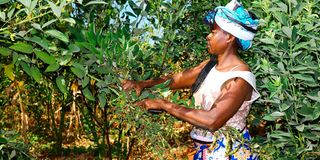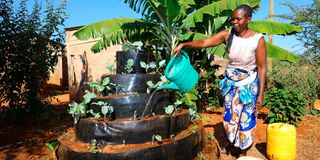10 Kenyan counties where climate change hits women farmers hardest

Avia Munyao from Ndiang’ui village, Mutomo Ward, Kitui South inspects her pigeon peas at her farm on July 5, 2023. She is a beneficially of a four year gender-responsive climate smart agriculture project in the arid and semi-arid land spearheaded by UN Women Kenya and Food and Agricultural Organisation.
What you need to know:
- Avia Munyao is among vulnerable women farmers in 10 Kenyan counties where most rely on agriculture but few own land.
- The government has launched new initiatives to provide women with climate-adaptive technologies and support.
In the arid landscape of Mutomo, Kitui County, Avia Munyao's story is one of resilience, adaptation, and transformation. For years, this livestock farmer watched helplessly as extreme weather patterns threatened to destroy her primary source of income. But today, she stands as a testament to how climate-smart farming can turn vulnerability into prosperity.
Until 2020, drought was Avia's greatest enemy. Her indigenous goats—the backbone of her livelihood—would often fall victim to the harsh realities of climate change, leaving her family's income in jeopardy.
"You know, during the drought, there was a lot of stealing, and because I didn't know a better way of feeding them, I'd just release them to go to the nearby bushes, where some would be stolen," she recalls, speaking to Nation last Wednesday.
The challenges didn't end with theft. Poor grazing practices meant that even the goats that stayed safe often didn't survive the harsh conditions.
"But of course, others used to die because if they graze in the same place repeatedly and there are no bushes left to feed on, they will die, and that is what used to happen," she explains.
A life-changing training program
Everything changed when Avia received training from an organisation in climate-smart livestock farming. The knowledge she gained fundamentally transformed her approach to animal husbandry and opened doors to new possibilities.
Armed with fresh insights, she made a bold decision: she sold all her indigenous goats and invested in a new breed altogether. The Galla goats she now rears are not only highly tolerant to water and food scarcity but also command impressive market prices.
Today, Avia maintains a herd of 60 Galla goats and has already reaped the financial benefits of her strategic shift. She recently sold 30 of them, with a six-month-old goat fetching Sh12,000—a significant improvement from her previous earnings.
Her approach to feeding has also evolved dramatically.
"Now I grow greengrams and keep the crop waste as feed for them during the dry season," she says.

Avia waters her kitchen garden on July 4, 2023. She has planted collard greens and spinach among others in the kitchen garden. She went from watching her livestock die in droughts to earning thousands from climate-resilient farming.
Avia's experience reflects a wider reality facing women farmers across Kenya. She is among countless vulnerable women whose livelihoods are threatened by climatic shocks due to their heavy reliance on agriculture.
Kitui County, where Avia farms, is one of 10 counties that the State Department for Gender and Affirmative Action has identified as areas where women farmers bear the brunt of changing weather patterns. The other affected counties are Meru, Nyamira, Kakamega, Bungoma, Nandi, Kisii, Murang'a, Machakos, and Homa Bay.
According to a study mapping gender and climate change hotspot counties across Kenya's agriculture, water, and energy sectors, women farmers in these areas face heightened vulnerability. The research reveals that 53.4 per cent of women in these regions rely on agriculture for survival, whilst only 22.2 per cent own land.
Government response and future plans
Recognising the urgent need for intervention, the government has outlined strategies to protect women farmers from climate-related devastation. The department recommends providing women with climate-adaptive technologies tailored to their specific needs, alongside accessible information on climate adaptation—exactly the kind of support that transformed Avia's life.
Gender Cabinet Secretary Hanna Cheptumo emphasised the importance of the research during the second bi-annual National Gender Sector Working Group meeting in Nairobi on June 5, 2025.
"This study provides a vital reference point for designing and implementing gender-responsive and gender-sensitive interventions," she said. "This will go a long way in guiding the effective integration of gender into climate policies and programmes, including finance."
The meeting also marked a significant milestone with the launch of a sixth thematic area under the National Gender Sector Working Group: gender, climate change, and disaster risk reduction, along with a corresponding subcommittee.
"Once operational, this subcommittee will be instrumental in coordinating matters relating to climate change from a gender perspective and, most importantly, in supporting implementation mechanisms," Cheptumo noted.


